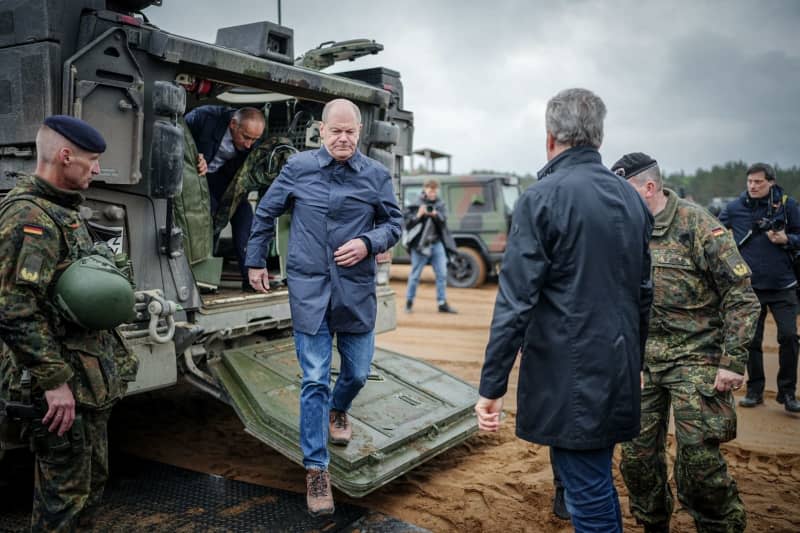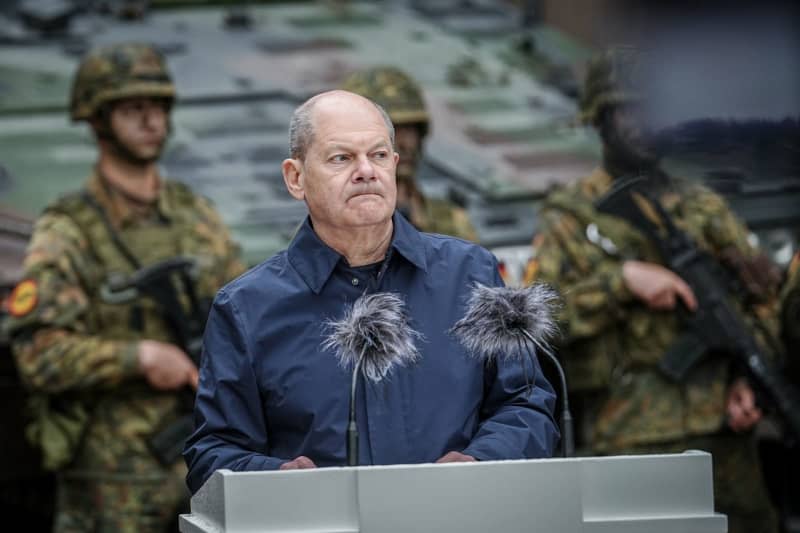German Chancellor Olaf Scholz assured NATO partners in the Baltic Sea region of Germany’s reliable military defence support during a visit to the region on Monday.
In Riga, Scholz also responded to Russian plans to hold tactical nuclear exercises, which has been seen in the West as an attempt at intimidation by the Kremlin.
“It is always important to say loudly that nuclear weapons must not be used in this war,” Scholz said while in Riga on Monday, during his first visit to Latvia as German chancellor.
In Riga, Scholz met the leaders of Latvia, Estonia and Lithuania. Earlier in the day, the chancellor visited German soldiers stationed in the small Lithuanian town of Pabradė, alongside Lithuanian President Gitanas Nausėda.
The trip is intended to highlight the strategic importance of the Baltic states, particularly in the wake of Russian aggression, and Germany’s commitment to defence of the three NATO allies.
Scholz said that Russia had miscalculated with its invasion of Ukraine.
Instead of dividing Europe and weakening NATO, Scholz said, Russia’s aggression has unified and strengthened the alliance.
Latvian Prime Minister Evika Siliņa, along with her counterparts Kaja Kallas from Estonia and Ingrida Šimonytė from Lithuania, welcomed Germany’s military support for the Baltic states on Monday.
All three Baltic leaders called on the partners in the European Union and NATO to spend more money on defence in view of the Russian threat.
“We know that Russia’s goals and its unjustified imperial ambitions go far beyond the borders of Ukraine,” Šimonytė said. “The security of the Baltic states depends directly on the victory of Ukraine.”
Russia is on the way to a long-term confrontation with NATO and the entire democratic world, she said, and emphasized that the joint “top priority should be effective deterrence.”
The Baltic states, which are all members of the EU and NATO, are among Kiev’s most ardent supporters and have expressed fears that the Kremlin’s military aggression will not stop at Ukraine.
All three countries share a border with Russia and were once part of the Soviet Union.
Šimonytė touted the increased defence spending by the Baltic states and Poland – all of which are spending well above NATO’s target of 2% of gross domestic product (GDP) – as a strong example for other allied countries.
Earlier on Monday during his visit to the military training ground in Lithuania, Scholz along touted Germany’s increased investment in its defence capabilities: “This is also linked to the decision that investment in the Bundeswehr will comprise the 2% of our economic output in the long term, year after year. That has been achieved this year and will not change again.”
Scholz highlighted Germany’s military commitment and plans to permanently station a brigade in Lithuania.
“Germany stands firmly at the side of the Baltic States. And that means that we will protect each other and that all states can rely on us to defend every inch of their territory,” Scholz said.
Germany is still making preparations for the permanent Bundeswehr brigade in Lithuania, which will eventually include around 4,800 soldiers. The aim is for the unit to reach full combat readiness by 2027.
A preliminary detachment has arrived. Soldiers from the Bundeswehr’s 10th Armoured Division are also currently taking part in a major NATO exercise in Lithuania.
Nausėda thanked Scholz for Germany’s commitment to Lithuanian defence, and said the country would make sure that the soldiers are comfortably welcomed. But has also urged speed: “We cannot afford the luxury of wasting even a minute.”
The future base for the German brigade is expected to be located near the border with Belarus, a close ally of Russia, and near the Suwałki Gap that runs along the Polish-Lithuanian border.
There is concern that Russian forces could attack in a future conflict along the Suwałki Gap from Belarus and the Russian exclave of Kaliningrad, cutting off the Baltic states from the other NATO countries.
Scholz also met with some of the 12,000 German soldiers who are in Lithuania as part of large-scale NATO manoeuvres dubbed Steadfast Defender. According to the German government, the exercises – involving a total of around 90,000 NATO troops – are the largest NATO manoeuvre since the end of the Cold War.




